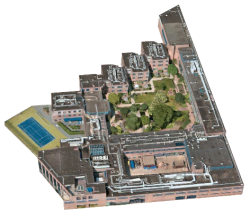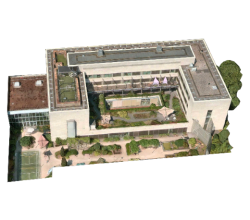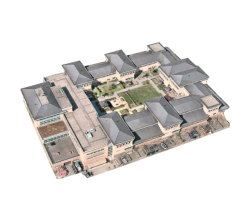Van der Hoeven Kliniek
Van der Hoeven Kliniek is a forensic psychiatry centre where patients with a hospital order or supervision order learn how to live safely and responsibly. The clinic provides customised care, which means treatment is tailored to the patients' needs.
What is a hospital order?
A hospital order (TBS) is a criminal sanction for people who have been found fully or partially unaccountable for their actions due to psychiatric problems. These people have often committed a serious crime punishable by at least four years in prison. There must also be a risk of recidivism.
The duration of a hospital order is indefinite and is reviewed regularly. After two years, the court can extend the hospital order for one or two years at a time.
What is a supervision order?
A supervision order is imposed by a civil court if the court determines it is better for the safety of the patient and those around him to receive inpatient forensic psychiatric help. Care authorisations are an example of this measure.
Why are people treated at Van der Hoeven Kliniek?
Our patients are men and women over 18 with mental health problems. Many of them also have other problems, such as addiction or financial concerns. As a result, they have committed serious crimes or pose a danger to themselves or others. Our clinic provides treatment to reduce the risk to the patients and society.
Treatment
At Van der Hoeven Kliniek, patients reside in a therapeutic living environment. This means that everything they do contributes to their treatment and the safety of society. This includes living in groups, attending therapy and working.
Therapy
Most patients receive psychotherapy, either individually or in a group. Together, we examine their life course to understand how they became who they are. This is recorded in a cognitive profile. During the ‘crime scene procedure’, they discuss the crimes they committed and the circumstances surrounding them. They also create a future plan and a relapse prevention plan.
Group housing
Patients live together in groups. Each group shares a living room and kitchen. Each patient has a private bedroom with basic amenities. Patients are jointly responsible for housekeeping. Those who are further along in their treatment can practice independent living in on-site apartments. When they are ready, they can also live outside the clinic; this is called transmural living. Patients who do not reside in a group live in an individual ward.
Working
Work is important for a successful return to society; it provides structure and income. The workshops are run by experienced professionals. Patients can take various certified training courses to help them find jobs after their treatment, which further reduces the risk of recidivism and helps them build a future.
Leisure
In addition to treatment, there is also room for sports and art. Sports help patients relax and release their energy. A variety of sports are available, including football and judo. Art subjects offer patients an opportunity to discover talents, which may lead to a hobby. This is important for their resocialisation, as hobbies help prevent recidivism.
Risk management
Safe living environment
Treatment is aimed at increasing safety in society. The clinic follows the latest guidelines for effective treatment of mental disorders, and a safe living environment is essential to that.
Risk assessment
Risk assessment is used to identify each patient's risk and protective factors, which helps to reduce risks.
Risk factors
Risk assessment involves looking at factors that could lead to problems, such as impulsivity or work struggles. The treatment team addresses these risk factors in treatment plans and monitors progress.
Protective factors
The clinic also looks at protective factors that reduce the risk of recidivism. such as a stable network, an education or a job.
Leave
Leave authorisation
The Toetsingskader (the authority responsible for assessing and authorizing leave) of the Ministry of Justice and Security is in charge of authorising leave for patients under a hospital order. The clinic can only apply for leave if certain conditions are met: patients must write a motivation letter, a risk assessment must be conducted, and the clinic council must provide its opinion.
Phases of leave
There are four phases of leave: escorted leave, unescorted leave, transmural leave and trial leave. Compassionate leave is also available for personal circumstances such as the death of a loved one.
After the final leave phase, the judge may conditionally terminate the compulsory treatment. This often involves forensic psychiatric supervision, which means that the clinic remains responsible for the patient but an outpatient forensic care facility takes over treatment and supervision.
Victim policy
Our victim policy is important at Van der Hoeven Kliniek. Network supervisors maintain contact with the patient's network and Victim Support Netherlands, and inform victim organisations when a patient returns to society.
Victim assessment
Before a patient goes on leave, a victim assessment is conducted to determine any effects and risks the leave may have on victims and those around them. Based on this assessment, additional conditions may be imposed on the leave, such as a restraining order.
Contact
Van der Hoeven Kliniek has three facilities, located at Willem Dreeslaan and Oudlaan in Utrecht and Utrechtseweg in Amersfoort.



